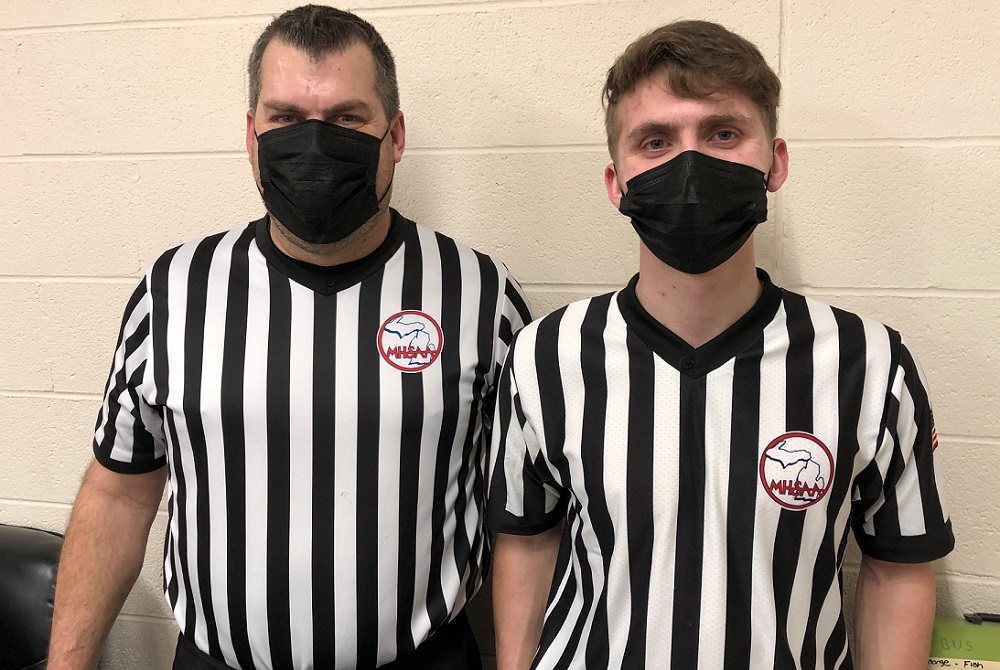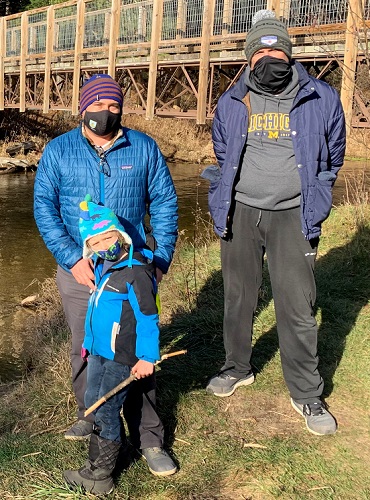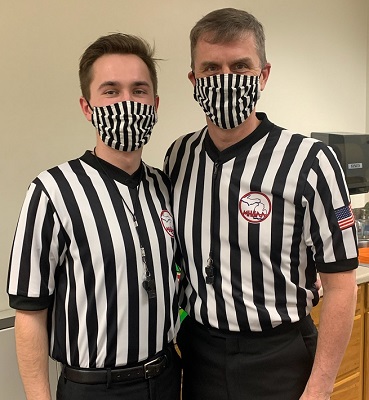
Legacy Families Bolstering North's Officiating Ranks
By
Tom Spencer
Special for MHSAA.com
March 12, 2021
When Marc Crossman was attending middle and high school at Benzie Central, he didn’t attempt a shot. He never blocked a shot either.
 For that matter, the 2019 grad was never charged with a foul or a violation, nor credited with an assist.
For that matter, the 2019 grad was never charged with a foul or a violation, nor credited with an assist.
Today, he uses the fitness he’s kept up from his track and cross country days at Benzie to call fouls and violations. And, nearly every day, he assists high school boys and girls on basketball courts all over Northern Michigan.
Crossman is one of very few young MHSAA basketball officials in the north. He is also among a handful of father-son basketball and other sports officials calling Northern Michigan home.
“I tell you what man, I was probably the most dedicated fan in high school,” he said. “I went to all the home games. All the away games, boys, girls.
“When I was in high school, I was obsessed with the game of basketball.”
Crossman did play elementary basketball. He tried out for the Huskies middle school team but wasn’t chosen.
“That was the end of my basketball career,” proclaimed Crossman, who also officiates football. “And then it started up again when I was a junior when my dad (Don) roped me into the whole legacy thing with officiating.
The MHSAA’s Legacy Student Officials Program is open to any high school student at least 14 years of age. Freshman and sophomore student officials may officiate at the junior high/middle school level only, and junior and senior student officials may officiate at any subvarsity level.
 The Legacy Program pairs a student with a mentor official, which can be set up through direct contact with an official the student knows, or with help from the student’s athletic director in making contact with a local approved officials association. Lucky for Crossman, he did know someone, his father Don, an assignor for the Northern Michigan Sports Officials Association.
The Legacy Program pairs a student with a mentor official, which can be set up through direct contact with an official the student knows, or with help from the student’s athletic director in making contact with a local approved officials association. Lucky for Crossman, he did know someone, his father Don, an assignor for the Northern Michigan Sports Officials Association.
Don is a nine-year veteran official registered in baseball, softball, volleyball and football. He’s aware of the severe shortage of officials in general, but keenly aware most officials are closer to retiring than starting on the hard court. He’s enjoyed working with his son and assigning him with others.
He also has the good fortune of having other father-son combinations to assign. Among them are Tom and Ben Post and John and Jayden O’Hagan. Ben Post and Jayden O’Hagan also started in the Legacy Program, with Ben among the first to take part.
Tom Post has been a registered official for 48 years and honored with MHSAA Finals assignments. John O’Hagan has 36 years of basketball experience and registered for baseball and softball spanning two decades.
All of those fathers and sons indicate they enjoy working together and with other partners, but note officiating comes with some challenges.
Most come from fans and coaches rarely seeing a young referee in the crew.
“There have been a few games where the coaches just seem to get in his (Jayden’s) ear more than the experienced official,” said his father. “My fear is that Jayden — and all other referees — might one day say ‘I had enough of getting screamed at all the time and want to quit.’
“We talk to coaches, we explain their youth and that we are teaching and trying to recruit more young officials,” John O’Hagan continued. “Recruiting is difficult enough encouraging people to get registered; however, when the coaches and fans simply forget it is just a game, that we are human and we will make mistakes, their behavior can deter folks from becoming a referee.”
With ongoing support and teaching from his father and regular partner Dave Nemecek, Jayden is excited to hit the court after his days as a college student.
“My dad has taught me everything I know when it comes to the game and rules side of it,” noted the 19-year-old O’Hagan. “He’s always watching me and having me do certain things to make sure that I’m doing the best I can.
“So when there’s nights I’m just not having it or am not doing good, he makes sure to let me know,” he continued. “He always keeps me on top of my game.”
The assignor Crossman enjoys helping his son navigate the referee waters.
“It is awesome, very cool,” he said. “It is fun to see him grow. It is a challenge for me to help him grow.”
 Ben Post is among a significant number of Northern Michigan referees not officiating during the current pandemic. He had been on the hard court every year since graduating from college and starting to teach at age 24 in 2004.
Ben Post is among a significant number of Northern Michigan referees not officiating during the current pandemic. He had been on the hard court every year since graduating from college and starting to teach at age 24 in 2004.
“I absorbed his (my father’s) officiating philosophy pretty much through osmosis, and as a result we call a pretty similar game, although I have no hope of matching his competence or consistency,” Ben Post pointed out. “My dad is most in his element while working a game, and I’ve cherished every opportunity to watch and study him in that element, first as a fan and then while working alongside him.”
The pandemic has younger northern referees like Gabriel Wise, Gabe Janowiak, Brandon Nichols, Marc Crossman and Jayden O’Hagan perhaps finding themselves in tougher assignments than they anticipated this early in their careers.
“Now you’re in it,” Don Crossman said of the opportunities taken on by the younger refs. “You’ve proved yourself on a fast track.
“You’re just one of the guys now,” he continued. “It is real exciting.”
Younger referees are becoming a welcome site nowadays for coaches and athletic directors.
“When a crew comes to the gym and there are officials of varying ages, the diversity provides credibility to the crew as a whole,” said Steve Graetz, Benzie’s athletic director.
Graetz is filled with pride when he sees the youthful Crossman on the court, especially knowing he started doing many middle school games at Benzie in the Legacy Program.
“It was a safe environment in which Marc could learn the craft,” Graetz said. “To see him now regularly officiating high school games at varying levels on a regular basis speaks as much to the hard work he has put into learning and improving as it does to the accommodating format and structure of the Legacy Program.”
 Tom Spencer is a longtime MHSAA-registered basketball and soccer official, and former softball and baseball official, and he also has coached in the northern Lower Peninsula area. He previously has written for the Saginaw News, Bay County Sports Page and Midland Daily News. He can be reached at [email protected] with story ideas for Manistee, Wexford, Missaukee, Roscommon, Ogemaw, Iosco, Alcona, Oscoda, Crawford, Kalkaska, Grand Traverse, Benzie, Leelanau, Antrim, Otsego, Montmorency, Alpena, Presque Isle, Cheboygan, Charlevoix and Emmet counties.
Tom Spencer is a longtime MHSAA-registered basketball and soccer official, and former softball and baseball official, and he also has coached in the northern Lower Peninsula area. He previously has written for the Saginaw News, Bay County Sports Page and Midland Daily News. He can be reached at [email protected] with story ideas for Manistee, Wexford, Missaukee, Roscommon, Ogemaw, Iosco, Alcona, Oscoda, Crawford, Kalkaska, Grand Traverse, Benzie, Leelanau, Antrim, Otsego, Montmorency, Alpena, Presque Isle, Cheboygan, Charlevoix and Emmet counties.
PHOTOS: (Top) MHSAA officials Don Crossman, left, and his son Marc. (Middle) Ben Post, top left, with father Tom Post and son James. (Below) Jayden O’Hagan, left, and his father Jon O’Hagan. (Courtesy photos.)

Gooding & King Work to Fill SW Michigan's Officiating Ranks, Schedules
By
Pam Shebest
Special for MHSAA.com
December 12, 2023
KALAMAZOO – Cheer them or boo them, without officials, there are no games. That’s just a fact in the sports world.
 Two area men are tasked with supplying those officials for Southwest Michigan schools, and it is not always as easy as it seems.
Two area men are tasked with supplying those officials for Southwest Michigan schools, and it is not always as easy as it seems.
Portage’s Todd Gooding is in charge of assigning football referees for 70 schools across eight leagues, with 500 officials on his staff.
Vicksburg’s Rob King assigns officials for girls and boys basketball in five leagues and has 290 men and women on his roster to work 1,100 games throughout the hoops season.
“We have six females on staff,” King said. “We’re looking to add more. I think the girls who are playing enjoy having a female ref on the court with them, plus it shows them they can do this, too.”
Although totals were dropping a few percentage points every year, the MHSAA still registered an average of 10,317 officials annually during the decade ending in 2019-20. But the beginning of the COVID-19 pandemic that spring played a large part in a decrease in registered officials by 12 percent for 2020-21, down to 8,090.
The last two school years saw a bounce-back of four percent, and recruiting and retaining efforts continue. But Gooding and King – also veteran officials themselves, Gooding for 25 years and King for 24 – and their assigning colleagues across the state have the closest look at the effects of fewer officials as they work to schedule at the local level and make sure everything is covered.
Doing so gets even harder with unforeseen roadblocks.
One of those challenges for Gooding came in August when extreme heat forced most schools to reschedule or delay their football games.
“Everyone was trying to get their games in,” he said. “We were moving start times back, then we were moving days. Football is a little different than basketball or baseball because you can only play within so many days, so we were really squeezed against the schedule.
 “I had a school or two reach out on Monday or Tuesday (before the Friday night game), so they looked ahead at the heat. Some of them waited, waited, waited, and then in some cases, it posed some big challenges because most of those crews had been spoken for.”
“I had a school or two reach out on Monday or Tuesday (before the Friday night game), so they looked ahead at the heat. Some of them waited, waited, waited, and then in some cases, it posed some big challenges because most of those crews had been spoken for.”
For a typical football Friday, Gooding staffs 30 or 35 games, “which is really difficult because everybody wants to play Friday night.”
Some referees in both football and basketball “double dip” by officiating games at freshman or junior varsity levels on nights other than Friday.
Gooding said at one time he hoped to go to seven officials for a football game, but with a shortage of officials, “Right now we’re just lucky to staff five in the games we have, and we’re still very short.
“Parents are a key component to a shortage of officials. A lot of it is more at the youth level, but everyone has to remember the sportsmanship aspect. Without officials there are no games, and sometimes we lose track of that, and that’s one reason there’s a shortage.”
Still, King noted that officiating provides more advantages than disadvantages.
“Everyone hears about the bad stuff, getting yelled at by fans and coaches, but those are so small,” he said.
“After a season of doing this, you learn to block out that stuff and realize it’s just part of the game. Fifty percent of people are mad at you every time you blow the whistle, so you get used to that.”
Pay raises in some leagues enticed many of those who “retired” to return, King said, but both he and Gooding agree the camaraderie developed while officiating is what makes it most special.
“It’s more about the time you spend on the floor with guys, in the locker room, driving to games, grabbing something to eat after the games, just talking about life, just building friendships,” King said. “That’s the part you remember.”
Gooding added some games stick in his memory more than others.
“My first varsity game (refereeing) was Lawton playing Saugatuck,” he said. “I show up and Channel 3 was there. I wondered what’s going on.
“Both schools were 0-8, both senior classes were 0-35. Somebody had to win, and it was my first varsity game. I think Saugatuck won, and it was close to 25 years ago.”
Another memory came as he officiated a basketball game.
 “A girl from Benton Harbor (Kysre Gondrezick in 2016) had 72 points,” he said. “It’s in the record books. and you’re just one small part of that and you remember them.”
“A girl from Benton Harbor (Kysre Gondrezick in 2016) had 72 points,” he said. “It’s in the record books. and you’re just one small part of that and you remember them.”
Officiating is not only for adults. Even teenagers still in high school can become referees as part of the MHSAA Legacy Program.
King recently hosted an officiating summit at Paw Paw for high school athletes.
“There are nine schools in the Wolverine Conference and six of them brought 10 to 15 kids,” he said. “Myself and another official presented on basketball. They also did something on other sports.
“We got the kids up blowing the whistles and doing some of the signals. Three reached out wanting to get involved.”
King said officiating is a great way to earn money, especially while in college.
“You’ll work maybe two or three hours at the most and make $150 to $300 depending on the level,” he said. “Your friends will have to work six-, seven-, eight-hour days to make that much money.
“You can also block your schedule. We have a software with a calendar on it. If there are days you know you can’t work because you have classes or other things, you just block those days out, so you control your own schedule.”
With training, freshmen and sophomores can work junior high/middle school games, and juniors and seniors are able to officiate at the freshman and junior varsity levels.
“Usually what we do is get you a mentor,” King said, “and you work with that mentor and make some money.”
Those Legacy officials hopefully continue in the avocation, eventually becoming the next mentors.
Officiating, like school sports in general, is a cycle that’s constantly in motion – both when it comes to filling the ranks and filling the schedule to cover games ahead.
For example, although football season is over, “I don’t know if there really is an offseason,” Gooding said. “Leagues are going to start giving me their schedules. We’ll get those into an Arbiter system. Everything’s assigned by Arbiter, a computer system where officials get their assignments.
“I’ll start evaluating the crews, reach out to the crew chiefs. They’ll let me know any changes in their crew dynamics. I’ll evaluate the year gone by, how they performed and then start getting ready to work on getting those games staffed. That will start after the new year.”
For more information on officiating, including the Legacy Program, go to the Officials page of MHSAA.com.
 Pam Shebest served as a sportswriter at the Kalamazoo Gazette from 1985-2009 after 11 years part-time with the Gazette while teaching French and English at White Pigeon High School. She can be reached at [email protected] with story ideas for Calhoun, Kalamazoo and Van Buren counties.
Pam Shebest served as a sportswriter at the Kalamazoo Gazette from 1985-2009 after 11 years part-time with the Gazette while teaching French and English at White Pigeon High School. She can be reached at [email protected] with story ideas for Calhoun, Kalamazoo and Van Buren counties.
PHOTOS (Top) Todd Gooding, left and Rob King take a photo together while officiating the Division 4 Final at Ford Field in 2022. (Middle) Gooding signals during that contest between Goodrich and Grand Rapids South Christian. (Below) King officiates the 2019 Division 4 Boys Basketball Final at Breslin Center. (Photos courtesy of Gooding and King.)

